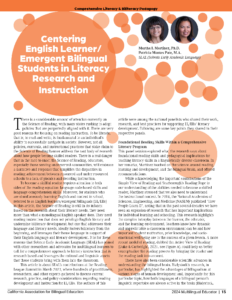Centering English Learner/ Emergent Bilingual Students in Literacy Research and Instruction

There is a considerable amount of attention currently on the science of reading, with many states rushing to adopt policies that are purportedly aligned with it. There are very good reasons for focusing on reading instruction. To be literate, that is, to read and write, is fundamental to an individual’s ability to successfully navigate in society. However, not all policies, curriculum, and instructional practices that stake claim to the science of reading banner address the vast body of research about how people become skilled readers. There is a real danger that in the race to enact the science of reading, educators, especially those serving underserved communities, will embrace a narrative and response that simplifies the disparities in reading achievement between resourced and under-resourced schools to a lack of phonics and decoding instruction.
To become a skillful reader requires attention to both sides of the reading equation: language code-based skills and language comprehension skills. Moreover, for English Learners/Emergent Bilinguals (EL/EBs), the science of reading is still in its infancy. Based on the research about their literacy needs, they need more than what a monolingual English speaker does. They need reading instruction that does not privilege English literacy and undermine biliteracy development, but one that addresses their language and literacy needs, ideally fosters biliteracy from the beginning, and leverages their home language in support of their English language and literacy development. . It is for these reasons that SEAL has joined with other researchers and advocates for multilingual learners to call for a comprehensive approach to literacy instruction that is research-based and leverages the cultural and linguistic assets that these students bring with them into the classroom.
This article is about SEAL’s contributions at the Reading League Summit in March 2023, where hundreds of practitioners, researchers and other experts gathered to discuss current research, practice and policy considerations regarding reading development and instruction for EL/EBs. Dr. Martha I. Martinez and Ms. Patricia Montes Pate, the article’s authors, were among the national panelists who shared their work, research and best practices for supporting EL/EBs’ literacy development. To read more about the key points they shared related to Foundational Reading Skills Within a Comprehensive Literacy Program and Developing Oral Language, Vocabulary, and Background Knowledge, click here.
